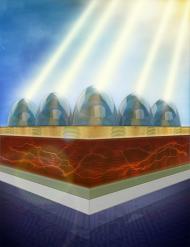Manuel J. Mendes Website
Professor of Photonics, Photovoltaics and Optoelectronics subjects
CENIMAT-i3N and CEMOP-UNINOVA, Faculdade de Ciências e Tecnologia, Universidade Nova de Lisboa. Campus de Caparica. 2829-516 Caparica. Portugal (email)
CENIMAT-i3N and CEMOP-UNINOVA, Faculdade de Ciências e Tecnologia, Universidade Nova de Lisboa. Campus de Caparica. 2829-516 Caparica. Portugal (email)
Manuel J. Mendes is currently Associate Professor with Habilitation in the Dep. of Materials Science of NOVA School of Science of Technology (NOVA SST).
He was born in Lisbon, in 1982. He received the Engineering degree in Physics in 2005 from Instituto Superior Técnico, Univ. de Lisboa (IST-UL), the Master of Science degree in Applied Physics in 2008 from Rice University (Houston, USA), and the Ph.D. in Photovoltaic Solar Energy in 2012 from Instituto de Energía Solar (Madrid, Spain) on the novel topic of Nanophotonics for Multi-Band Photovoltaics.
He has been involved in ~40 projects in energy-related areas while working in USA (2005-08), Spain (2008-12), Italy (2012-14) and Portugal (2014-present). His research in Portugal has been performed at the Materials Research Center CENIMAT-i3N of NOVA School of Science & Technology (Univ. Nova de Lisboa), where he has been PI of 7 projects (3 national, 4 European) and institution responsible for other 7 projects (5 national, 2 European) related with Photonic-enhanced Solar Cells, Quantum-structured Semiconductors, Building-integrated photovoltaics (BIPV) and Solar Fuels. Overall, he attracted a total funding of ~7 M€ to NOVA via projects that he coordinated.
He has acted as reviewer for >40 scientific journals, is author of >80 peer-reviewed publications, and co-inventor of 2 U.S. Patents. The first patent was distinguished with an award from NASA Inventions and Contributions Board, and the second opened a research line in plasmonic intermediate-band solar cells.
He has been awarded with 2 prestigious Marie Curie Experienced-Research Fellowships (in 2012 and 2014) related with light management for solar cells, as well as 10 prestigious scientific honours, such as the 2020 FEMS Communication Award for Excellence in Materials Science & Eng. and the 2021 IN3+ Award of Imprensa Nacional Casa da Moeda (INCM) - the highest national prize for individual innovation projects. In 2023, an ERC Consolidator Grant was awarded to his project X-STREAM (Power-to-X: Streaming Hydrogen from 3-Band Solar Cells boosted with Photonic Management).
Research interests:
|
 |